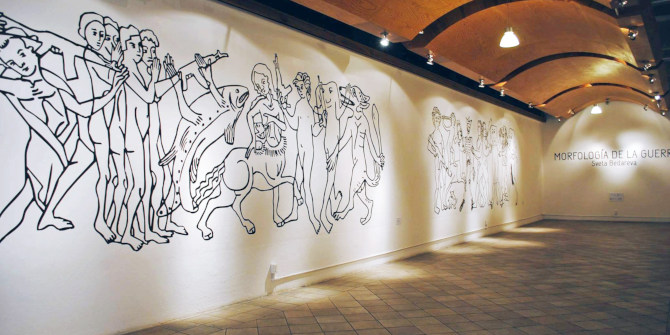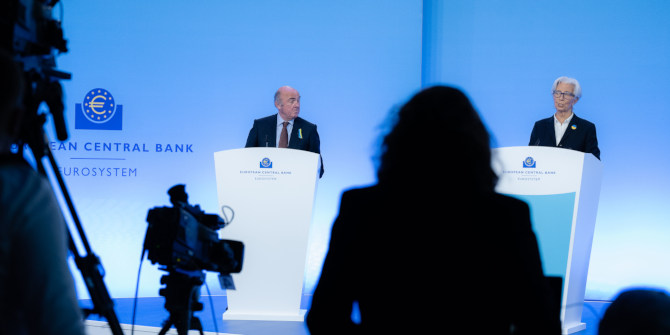 Following the annexation of Crimea earlier this year, the EU has implemented escalating sanctions against Russia. Borja Guijarro-Usobiaga writes on the impact the sanctions are having on both Russia and Europe. He argues that with neither Russia nor the West willing to make unilateral concessions to solve the crisis, the most likely result is a lasting political deadlock until the costs experienced by both sides provide incentives to normalise relations.
Following the annexation of Crimea earlier this year, the EU has implemented escalating sanctions against Russia. Borja Guijarro-Usobiaga writes on the impact the sanctions are having on both Russia and Europe. He argues that with neither Russia nor the West willing to make unilateral concessions to solve the crisis, the most likely result is a lasting political deadlock until the costs experienced by both sides provide incentives to normalise relations.
On 29 July the European Union (EU) imposed so-called tier three sanctions against Russia. The real effect of these measures is only starting to be felt now, yet the implications are far deeper than many had imagined. At stake is not only Europe’s geopolitical and regional stability; businesses and individuals on both sides of the table are starting to feel the impact of sanctions as well.
The new round of sanctions imposed on Russia is in many respects unprecedented. The EU has restricted Russian banks’ access to long-term loans, it has imposed an embargo on the export of dual-use equipment for military use, and it has banned the export of a wide range of items and technology related to the oil industry. The gas sector, however, has been left untouched so far. These measures go far beyond the visa-bans and asset freezes that were already in place against certain individuals involved in the destabilisation of Ukraine.
But sanctions are also unprecedented for another reason: the EU had never before imposed economic sanctions against a country with which it shares so many commercial, energetic, and security ties. While the EU has had some experience – and some would even argue success – in the use of economic sanctions against Iran, this time it has entered into uncharted waters. And few seem to have thoroughly thought through the consequences of these measures.

Far from forcing Putin to back down and put a brake on his ambitions in Eastern Ukraine, sanctions have contributed to a hardening of his position. Moreover, and even though unintended, they have sparked nationalistic sentiments in Russia, with polls registering a spike in Putin’s popularity. Yet while Putin rallies support at home, the EU and the US are unwilling to go back to business as usual with him after the traumatic redrawing of Europe’s borders by an ever assertive Russia.
Escalation has thus led to a political deadlock where neither Putin nor the West are willing to make unilateral concessions to solve the crisis. And given the unlikely prospect of a direct military confrontation between the two parties, a war of economic attrition seems the only scenario left. With a solution to the regional crisis slipping away, the coercive effect of sanctions is starting to be felt on bothsides.
The economic costs of sanctions
Although no one knows for sure what the real cost of sanctions is, one thing is certain: they are imposing a huge economic burden on Russia. The flow of international investment into Russia has stalled, and the European Bank for Reconstruction and Development has frozen all new projects in the country. Moreover, Russian banks have seen their access to Western capital cut. This has increased the refinancing costs of banks, making it increasingly difficult for Russia to pay its debt and limiting the Kremlin’s capacity to invest and modernise infrastructure, especially in the extraction sector.
Furthermore, the rouble has continued to fall against the dollar, increasing the cost of imports. These difficulties add to the shortages of products in supermarkets caused by Putin’s ban on imports of food and agricultural products from the EU, which has backfired forcing businesses to struggle for substitutes in an underdeveloped domestic market. To make things worse, inflation is expected to soar in the coming year.
Yet the most daunting task Putin has still to face is an uncertain future with increasingly low oil prices. With more than half of Russia’s revenues originating in the export of oil and gas, financing the budget deficit is likely to become challenging. Also, if prices remain low in the longer run, Russia is likely to have a bigger problem as its economy is stagnating and its budgetary estimations are based on high oil and gas prices.
However, sanctions are taking their toll in Europe as well. Most importantly, sanctions have generated an immense uncertainty among business circles. European firms are trying to make sense of the limitations and scope that sanctions impose on their commercial activities, including trade, investment and insurance operations with third parties operating in Ukraine and Russia. Due to the legal consequences that businesses could face if they violate sanctions, concerns have arisen regarding the extent to which it is possible to carry on with their regular activities.
Unfortunately, complying with sanctions is not a straightforward task. Besides the difficulties in understanding what is allowed and what is not due to a lack of clear regulatory provisions and national or European guidelines, other issues such as linguistic differences between EU and US provisions (e.g. concepts like “derivatives” mean different things in the US and the EU) pose further challenges for private companies. As a consequence, businesses are devoting increasing economic and human resources to make sure they comply with current EU and US legislation.
However, the biggest concern for EU policy-makers is the fear of Russian retaliation. Putin’s ban on food and agricultural imports from the EU has already had a very negative impact on Southern European farmers. And while the European Commission has reacted swiftly by setting up a compensation fund to pay for export losses, new retaliatory sanctions are looming on the horizon that might generate bigger disruptions for European economies.
The most obvious concern for some EU member states relates to a potential cut of Russian gas supplies during winter. Putin has warned EU countries and Ukraine that they could see the flow of gas stopped if the latter does not manage to pay its debts. Since the most important pipelines connecting Russia with EU countries cross Ukrainian territory, anxiety among member states that are heavily dependent on EU gas have grown.
But the Kremlin has also threatened to impose other countermeasures. First, it has insinuated that it could close its airspace to EU commercial flights. This would substantially increase the cost and duration of European flights to Asia, as airlines would have to divert to longer routes, consequently requiring larger amounts of fuel. And second, Putin has remained passive to legislative action in the Russian Duma that would allow for the nationalisation of foreign assets to pay for the losses of Russian companies.
The geopolitical implications of sanctions
While the current deadlock between the West and Russia over Ukraine remains, other actors have taken advantage of the situation. Latin American countries have been keen to replace the EU’s exports of food and agricultural produce following Putin’s ban on EU imports and have ignored EU pledges not to do so. Most strikingly, and even though the EU has managed to convince most of the countries on the path to EU membership to align themselves with its sanctions regime, Serbia has refused to do so, rolling out the red carpet for Putin’s visit to Belgrade in October instead.
The EU’s incapacity to convince its allies to support its sanctions regime has also been evident in Asia, where Japan has only imposed mild sanctions on Russia and where South Korea has refrained from imposing any measure whatsoever. Yet the indisputable beneficiary of Western sanctions has been China. Since the beginning of the crisis, China has played an ever more important role, with Russia moving closer to its eastern neighbour. The relations between both countries have improved substantially in the last months, leading to a historic agreement on the construction of gas pipelines from Russia to China.
Regional tensions are also mounting in other parts of Europe, as the Swedish government has been involved in the chase of an (allegedly) Russian submarine in its territorial waters and as Russian spy planes have repeatedly violated Estonia’s and Sweden’s airspace.
A way out?
The mutual trust that has been built between the West and Russia since the end of the Cold War has vanished. Undoubtedly, sanctions stand in the way of improving the relationship with the Kremlin, yet the EU is not willing to lift them without changes in Russia’s behaviour. Sanctions are thus likely to remain in place for the foreseeable future, with all the uncertainty that this implies.
However, the political deadlock should not be read as a new version of the Cold War. Russia is now much more integrated into the world economy, it has become a member of the World Trade Organization and it largely depends on its exports of oil and gas to keep its economy afloat. Moreover, it is questionable whether Russia’s new economic and political opening to Asia, and especially to China, constitutes a feasible long term alternative, as it will lead to an uncomfortable asymmetric relationship for the Kremlin. Whether this shift actually takes place remains to be seen, but it is more likely that Russia veers again toward Europe in the next few years.
The current uncertainty makes it hard to predict what will happen next or how long the conflict is likely to persist. The only thing that seems clear is that Crimea’s annexation by Russia is now an irreversible process. Russia will struggle to find international recognition for its action, and the West is likely to keep sanctions against the peninsula in place until a solution is eventually found in the future. But for the time being, this is likely to become yet another frozen conflict in the heart of Europe.
While many questions remain unanswered, western analysts are starting to accept that the standoff is going to last longer than initially expected. A solution to the crisis is however not impossible, but it will require huge doses of imagination, patience and, above all, time. As time passes and sanctions impose higher costs on both sides, incentives should emerge to normalise relations. The signing of a gas deal between Russia, Ukraine and the EU is a step in the right direction, yet it needs to be backed by a strong legal and political commitment by all parts. This could then lead to more compromises regarding the situation in Eastern Ukraine.
Please read our comments policy before commenting.
Note: This article gives the views of the author, and not the position of EUROPP – European Politics and Policy, nor of the London School of Economics.
Shortened URL for this post: http://bit.ly/1xumwCh
_________________________________
 Borja Guijarro-Usobiaga – LSE
Borja Guijarro-Usobiaga – LSE
Borja Guijarro-Usobiaga is a PhD candidate at the London School of Economics. His research focuses on EU sanctions and their effect on autocratic regimes.




